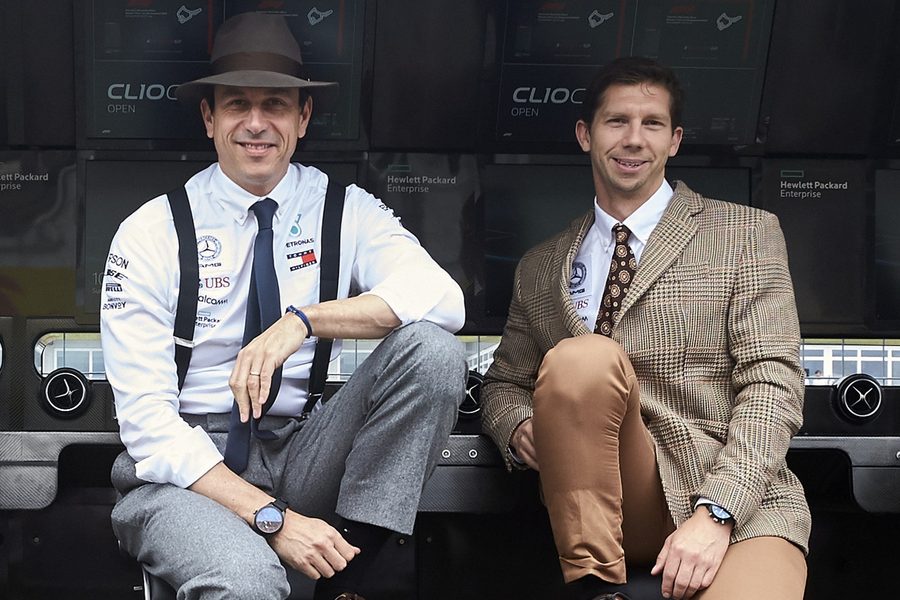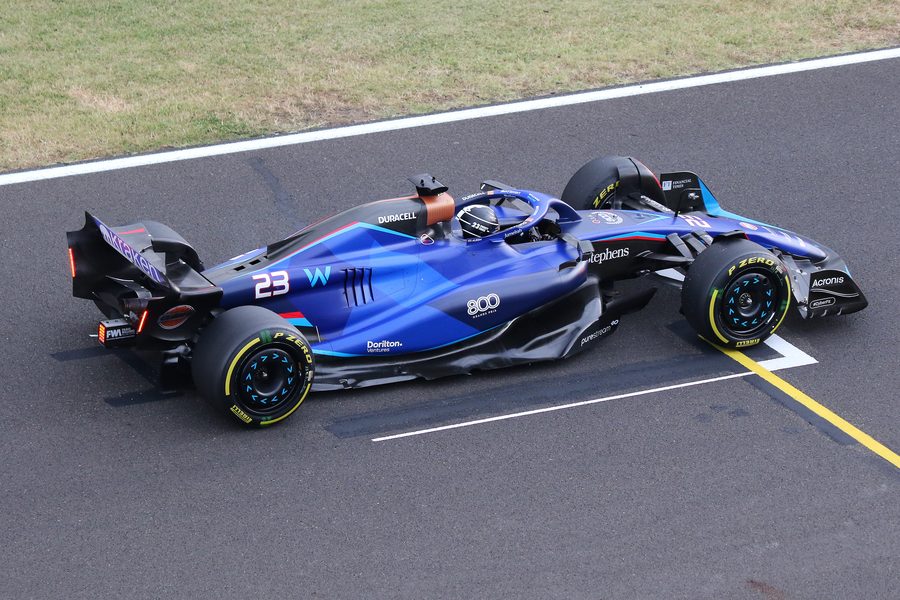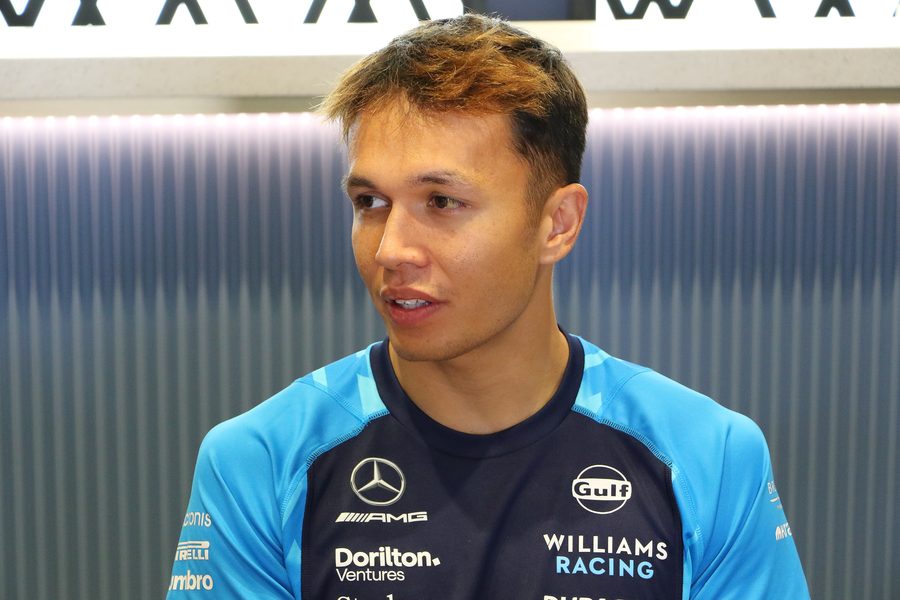James Vowles achieved tremendous success with Mercedes, and now he's facing a completely different and potentially more challenging task of bringing Williams back to the top. Roksana Ćwik interviewed him before the Hungarian Grand Prix, discussing his approach to his new team principal role, advice from colleagues in the industry, first impressions, and whether he answers the phone in a "Hello, it's James" manner.
You worked at Mercedes with Toto Wolff for many years before switching teams to Williams. What was your first thought when you arrived here?
I think the first thought of walking around the factory was more one of pride, I think was the first feeling. Because it's been not the journey of one year but the journey of 25 years almost to go to that point. And Williams as an organisation is one that it doesn't take long to walk around before you feel some emotions. Especially when you start seeing some of the cars from 20, 30 years ago, more than that, 40, 50 years ago. So pride was the first emotion that went round. Some of it was shock, which I spoke about afterwards. But it was just some of the car that the team is producing is good when you consider some of the handicaps that it has to walk through day by day as well. But often people think that you know what an organisation looks like inside. You don't. It's all from one team to the other, it's all a black box. Almost because you ignore them, you have to focus on yourself. So the first time I walked around Williams I thought how have you built a car this way, it doesn't make sense. So shock was the second feeling. But it was a long time, 22 years, which is for anyone even outside of motorsport that's a long time to be in one company. But irrespective it was still never since the day that I've changed have I had any regrets, which is the important part.
When did you first learn that you might become a Team Principal for Williams?
It was December. So after Jost [Capito] was sadly announced not to be here anymore, there were discussions ongoing at that time with Williams. They were very clean, they wanted to make sure the relationship with Jost was clean. And then after that they spoke to me. So around about December.
Have you spoken to Toto Wolff, and did he give you any advice beforehand?
Not just Toto, but also Fred Vasseur, Otmar [Szafnauer]… I'm trying to think of the other people I speak to daily. Probably those are the three main ones that we have chats about most of the time. Andreas Seidl as well. And all of them had advice. Not bad advice, but good advice. They all wanted me in a very kind way to be successful in this role. All different advice as well. If I had to summarise them, it would be: be yourself. Don't try and be something you're not, be yourself. It's really important. Thousands of things will come at you a day, so focus on just a few. Because you won't be able to do a thousand things, it's not possible at all. Be strong in what you're doing, which I always was before. But be strong in what you're doing because your strength will lead people in the right direction. Understand what journey you want to take the team on and be true to it as well. So there's good advice along that. Toto being a strong part of that. Fred's advice was different. He understands a lot more from his time in Alfa Romeo. Had to work with a team that was struggling a lot more. And his advice was more about how to bring in investment to the right level and how to move the team forward. Toto's was also around how to understand the finances of Formula 1 team, because they're very different to most organisations. But the advice wasn't just once, it was continuous. So for example in Austria you would have found Toto, myself, Fred. All together just having a chat. Just because we like to.

The beginning of the year is always challenging for everyone. Then the team introduced many improvements to the car, and Alex Albon scored a lot of points. Also, Logan Sargeant came close to scoring some in Silverstone. Is it difficult to make changes in a team like Williams?
No, but that's not because I think I'm special. I think the team has been through so much pain, that it's ready to do what it takes to move forward. For most organisations it's very hard to change the direction of travel. It takes many, many years. And it surprised me that within Williams, within months, we have a very small change of direction. But a positive change of direction. No, it hasn't been hard. Since I entered through the door, it's felt like home. Everyone I've spoken to has been nothing but welcoming to me. And everyone, every time you give them an idea, they're now running with the idea. They're not pushing it back and saying, we can't do that. Because they're moving the idea forward. So no, but it's not because I'm clever. It's because lots of hard work was done before I joined.
You are one of those individuals in the F1 paddock who works very hard and has a lot of accomplishments. However, when you work with such a small team like Williams after transitioning from Mercedes, and you know that the budget is much smaller than that of Mercedes, is it difficult to have an idea and know that you might not be able to realize it due to the limited budget and cost cap?
No, because part of the reason why I've been vocal publicly is everything can be changed with the right support. So, the cost cap, the budget cap is a very good thing. But there's two elements to it. What I've really been arguing is one is very good for bringing the teams together. The other one is really good for making the teams further away. So, let's change the one that's making us impossible almost to be a Red Bull or a Mercedes. And because rules are there to be changed, if it's the right thing for the sport, we're getting momentum from that. Over the next month, you'll see, I hope, the regulations change in a way that helps Williams on our journey. So, no, not really in that regard. But you have to do things cleverly. What doesn't work is hitting people over the head with a hammer. What works is sensible conversation where you just lay out the pathway that makes not just Williams better, but the sport better as well as a result.
Does the budget limit help prevent rivals from increasing their advantage too quickly?
The budget gap in terms of the operational spend, I think is bringing teams a little bit closer together. I really do think so. Most importantly, teams aren't worrying about, will we be in the sport in one year time? Because we now know what the cost is, and we can't spend everything that we need within it to keep going forward. This is a good thing. But if I give you some just simple numbers that you can go... In the UK, all companies have to submit their accounts, and it's called Companies House. If you go onto Companies House, you can see Red Bull has spent £442 million since 2006, and we've spent £99 million. So, big numbers of difference. That will have an impact. They have many, many machines, as I did at Mercedes as well, beyond my desires for finding performance. And as a result, Williams are, for example, just to produce a floor, we actually have to do a lot of it using external work. That cost me three times the price. So effectively, Red Bull can do three times as many floors as I can. I've made it very, very simple. It's a little bit more complicated than that. But that doesn't help me catch up to Red Bull, and that's the problem. So we need to find a mechanism to allow us to also catch up to Red Bull, because my vision for the sport, and you can say, well, obviously it's your vision, you're behind, but my vision for the sport is, you shouldn't be able to tell me who's going to win here on Sunday, or even what the top three is. It should be that when you get into a race event, there's a level of unpredictability. The best team still performs and wins across the season, but it shouldn't be that any one given event, you know exactly what's going to happen. Which you probably do. You can probably predict who's going to be winning, who's probably on the podium as well at the same time. Okay, it could be one of five drivers. But I think what becomes exciting in a sport, and what helps definitely when you look at sports around the world, is you want it year on year to be changing and evolving, and we're not. Mercedes had dominance, before that Red Bull had dominance, now Red Bull has dominance. That's the bit that we have to fix. And to fix that, it needs a lot of work. But we're in the right direction to change it. Some tweaks we have to do in the cost cap, some tweaks we have to do in other rules as well.

How good is Alex Albon?
He's okay [laugh]. I've known Alex for eight years. What I like about Alex today is the Alex you see today. I do think even it's worth asking him, but I think even over the last nine, ten months, he's evolved a lot as a character. His strength is he knows who he is. I know this sounds very simple. Many, many human beings always question, who are you? What's your goal? He doesn't. He's comfortable. He knows who he is, and that's important. Because once you have that, you know what your boundaries are. With Alex, he has two personalities. There's one here right now. He'll be making a joke right now. They'll laugh in about ten minutes. That's Alex out of the car. But in the car, he's as serious a competitor as I've ever known anyone else. If you're behind him, you're not getting through. He's not there to make your life easy. He's there to fight for every millisecond he can. And that's what I like about him. Because that's the bit that makes Formula One teams quick.
I'm asking about Alex because yesterday I asked him a question about rumours that he might replace Carlos Sainz at Ferrari. He told me that sometimes some rumours are good because they put him on the list for Ferrari. What do you think about these rumours? I know they are just rumours, but as a team principal what are your thoughts about it?
I'd be disappointed if other teams weren't going after Alex. I'd say that almost within weeks of being here, Alex is underrated. And I keep repeating it, Alex is very underrated. He earns his place in Formula One and he deserves his place in Formula One. And the proof of that is not me telling you, but the other teams also seeing that and saying to him, Alex, would you like to join us? But my job is to make sure he has an environment here where he knows he can grow, and we'll grow together. Because there's two things you can do in Formula One. You can join Ferrari and maybe every now and then get on the podium. Or you can join here and remain here and be a part of a journey that brings you back onto that. The difference is, you've left your mark on the sport because of it. And hopefully his answer was, this is where he feels comfortable.

Throughout Formula 1, certain things are constantly changing. For example, now there is a change regarding the type of tyres used in qualifying. As a team principal, you participate in some of these discussions. Aren't you afraid that F1 is experimenting too much with certain things and making the situation more complicated? Shouldn't these changes be simpler?
The intention behind the rules was, for sustainability purposes, to try and take another set of tyres away from a race weekend. Often, we will walk away from a race weekend, take a brand new tyre and strip it off, because we never used it. Whereas now in these regulations, for what you have here in qualifying, every single tyre will be used. That I'm confident of. But, to your point, are we changing too much, that it becomes confusing? I think in this particular regard, yes. Because I've had many questions from outside, not from yourself, but from others, that think that just this year, by the time we do the sprint races, which is six sprint races, and by the time we do this one as well, which is two more, and then F1 is not changing, it's very hard to actually find a weekend that's consistently the same. My view is the following. We should be evolving. We shouldn't just assume that we have the perfect programme as we do at the moment, so we should continue to evolve. I think the concept of what we've done here is sensible, but perhaps we should have done it in a slightly different structure and find the answer to it. I'd also say, if you look at where we are today compared to where we were five years ago… Five years ago, we did some crazy rule changes that were very bad for the sport. In my lifetime, I've changed the rules in really bad ways. The most extreme was we were driving around burning fuel off to do our qualifying time, and we're in a much better place now. But it's a really fine balance between continuous evolution and staying exactly where you are at the moment because of fear of change. I think this one may have pushed slightly over the boundary, but change is good because the world is adapting. If I give you an example of what I mean by that, our audience, I noticed this this morning when I walked out of the hotel, the audience outside the hotel is between 16 to 30-year-old women. I couldn't even find a man out there. It's perfect. Now, maybe this is me, obviously. But the point is, the sport's evolving, and we have to evolve as well at the same time. So I think change is a good thing, just too much in a year is where the confusion comes from.
You are working now with Mercedes AMG High Performance Powertrains as a client team, not a factory. What is the biggest difference between those two situations?
So I'd actually say today there is no difference to me because I hold a relationship with 200 people in that organization. So if I need anything, I'll call one of the 200 people and say, this has to be done now. But that will in time change. That will in time change because what Mercedes wants may be different to what I want. And actually, it's about finding the right way of working together with all three organizations to make sure that if they need a different layout, we also work for that layout at the same time. So it's not so much a customer relationship but one that's uniform with ourselves. It will always be a slight disadvantage, but the way that we are changing things, it won't be a big disadvantage.
And the last question. I hope you will be not nervous at me, but how do you answer the phone? Hello, it's James?
It's a good question. If I don't know who it is, so it's an unknown number, normally nowadays I don't answer the phone unless I know the number because there's just too many people on the number. If it's people I know, normally actually if it's someone I really know very well, I'll say, hey, how are you? I won't even say my name because they know who it is fundamentally, they've called me. And then people I don't know, I don't really answer the phone anymore.
Thank you so much for your time.
Thank you.




